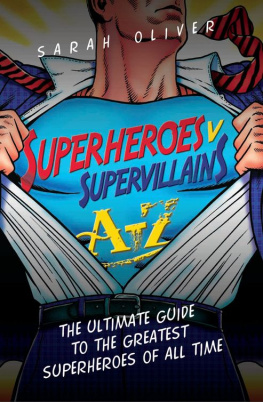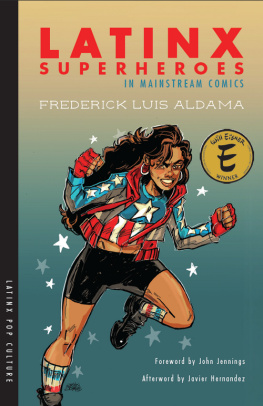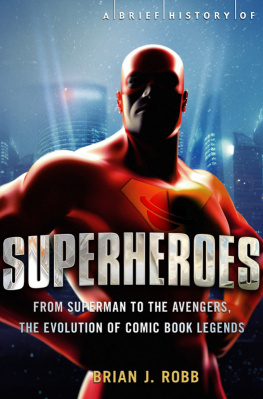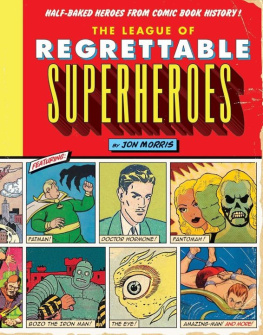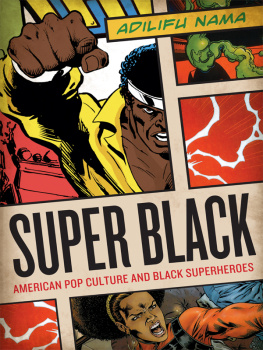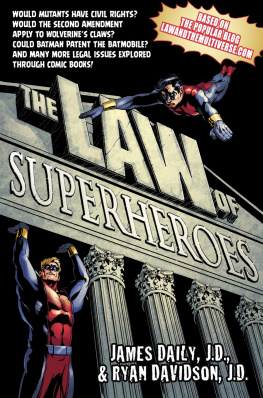Our Superheroes, Ourselves
Our Superheroes, Ourselves
Edited by Robin S. Rosenberg


Oxford University Press is a department of the University of Oxford.
It furthers the Universitys objective of excellence in research, scholarship, and education by publishing worldwide.
Oxford New York
Auckland Cape Town Dar es Salaam Hong Kong Karachi Kuala Lumpur Madrid Melbourne Mexico City Nairobi New Delhi Shanghai Taipei Toronto
With offices in
Argentina Austria Brazil Chile Czech Republic France Greece Guatemala Hungary Italy Japan Poland Portugal Singapore South Korea Switzerland Thailand Turkey Ukraine Vietnam
Oxford is a registered trademark of Oxford University Press in the UK and certain other countries.
Published in the United States of America by
Oxford University Press
198 Madison Avenue, New York, NY 10016
Robin Rosenberg 2013
All rights reserved. No part of this publication may be reproduced, stored in a retrieval system, or transmitted, in any form or by any means, without the prior permission in writing of Oxford University Press, or as expressly permitted by law, by license, or under terms agreed with the appropriate reproduction rights organization. Inquiries concerning reproduction outside the scope of the above should be sent to the Rights Department, Oxford University Press, at the address above.
You must not circulate this work in any other form and you must impose this same condition on any acquirer.
Library of Congress Cataloging-in-Publication Data
Our superheroes, ourselves / edited by Robin S. Rosenberg.
p. cm.
Includes bibliographical references and index.
ISBN 9780199765812 (acid-free paper) 1. Comic books, strips, etc.Psychological aspects. 2. SuperheroesPsychological aspects. 3. Psychology in literature. 4. Archetype (Psychology) I. Rosenberg, Robin S.
PN6714.O89 2013
741.59dc23 2012035088
1 3 5 7 9 8 6 4 2
Printed in the United States of America
on acid-free paper
To Stephen, with whom anything is possible
Contents
Robin S. Rosenberg
ONE
Our Fascination with Superheroes
Robin S. Rosenberg
TWO
Superhero Comics as Moral Pornography
David A. Pizarro and Roy Baumeister
THREE
Are Superhero Stories Good for Us?
Reflections from Clinical Practice
Lawrence C. Rubin
FOUR
Emotions in Comics: Why the Silver Age of Comics Made a Difference
Peter J. Jordan
FIVE
The Effects of Superhero Sagas on Our Gendered Selves
Elizabeth Behm-Morawitz and Hillary Pennell
SIX
Our Superheroes, Our Supervillains: Are They All That Different?
Travis Langley
SEVEN
Are Superheroes Just SuperGifted?
Robin S. Rosenberg and Ellen Winner
EIGHT
The Very Real Work Lives of Superheroes:
Illustrations of Work Psychology
Gary N. Burns and Megan B. Morris
NINE
How Super Are Superheroes?
Robert J. Sternberg
TEN
Seven Roads to Justice for Superheroes and Humans
Mikhail Lyubansky
This book, like every book, is a result of teamwork. The teams whose work has led to this book are numerous and varied.
Many thanks to the psychologists who contributed to this bookfor being willing to go a bit far afield from the usual type of chapters you write, and for doing it so well. Without you, there would be no book.
Thanks also go to the teams of comic book creators, interpreters, and storytellers, whose stories have intrigued and inspired so many of us.
The team at Oxford University Press deserves thanks both for their interest in publishing not just one book on superheroes, but a series, and for their faith in me to be series editor. Specifically, thanks to editor Abby Gross, and Director of Publicity (and superhero fan) Purdy, as well as Suzanne Walker, Justyna Zajac, Joan Bossert, and Tracy OHara.
Thanks to Catherine Carlin Alexander and Angelique Rondeau for their enthusiastic support in the early stages of bringing this book to life.
And of course, thanks to my family. To my brother, Steven, foramong many other thingsturning me on to superheroes when I was young. To my mother, Bunny, for supporting me always, in every way. To the other Stephen, for whom there are no words. And to David, Justin, and Neil, who got me interested in superheroes again, and to Rebecca. You are all my team, for which I am grateful.
Roy Baumeister
Department of Psychology
Florida State University
Tallahassee, Florida
Elizabeth Behm-Morawitz
Department of
Communication
University of Missouri
Columbia, Missouri
Gary N. Burns
Department of Psychology
Wright State University
Dayton, Ohio
Peter J. Jordan
Griffith Business School
Griffith University
Nathan, Australia
Travis Langley
Department of Psychology
Henderson State University
Arkadelphia, Arkansas
Mikhail Lyubansky
Department of Psychology
University of Illinois at
Urbana-Champaign
Urbana, Illinois
Megan B. Morris
Department of Psychology
Wright State University
Dayton, Ohio
Hillary Pennell
Department of
Communication
University of Missouri
Columbia, Missouri
David A. Pizarro
Department of Psychology
Cornell University
Ithaca, New York
Robin S. Rosenberg
Department of Psychiatry
University of California
San Francisco, California
Lawrence C. Rubin
Department of Social Sciences
and Counseling
St. Thomas University
Miami, Florida
Robert J. Sternberg
Department of Psychology
Oklahoma State University
Stillwater, Oklahoma
Ellen Winner
Department of Psychology
Boston College
Boston, Massachusetts
Y oud have to live in a cave to escape the current superhero craze. Most peoplefrom hardcore superhero fans to those with a less passionate interestfind themselves wondering about superheroes crossover into mainstream culture. Why are super-heroes so popular? we ask. We wonder what the popularity of superheroes says about us as a society. In essence, this curiosity is about our relationship with superheroes.
Beyond this meta-awareness of superheroes impact on our culture, even casual fans of superheroes are intrigued by some of the issues raised in superhero storiesissues of morality and justice, of personality and identity. As with any good fiction that endures, we resonate with the superhero characters, and their stories spark our imaginations. The power of these stories entices each of us to wonder: What would I do if I were in the superheros position? How realistic are the superheroes actions? What might it be like to live in their world or have their powers? In essence, these questions reflect a curiosity about superheroes as if superheroes were real. How they are similar to and different from us.
Both sets of issues ultimately are about psychological matters that relate superheroes to ourselves. Who better to discuss such psychological matters than psychologists? Thats the idea behind this book, which is a collection of essays by noted psychologists in which the authors apply their knowledge of psychology to our relationship with superheroes, and the extent to which superheroes psychological nature reflects human nature.
Next page

